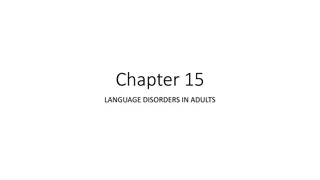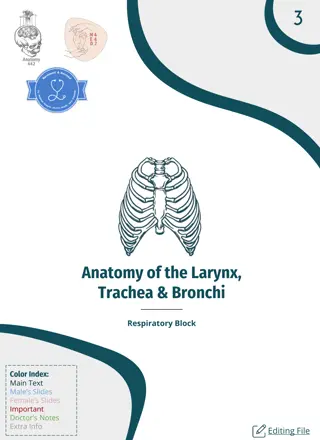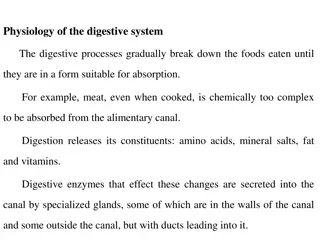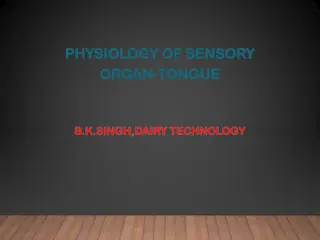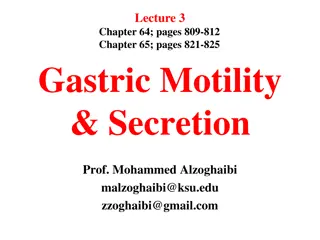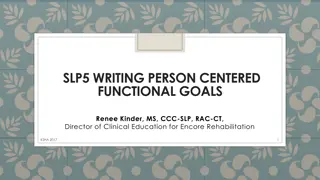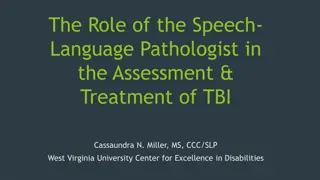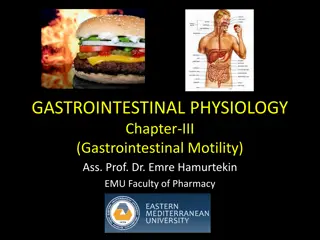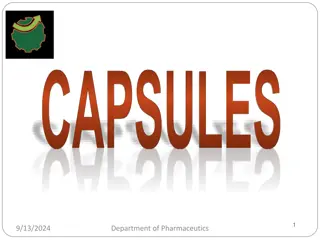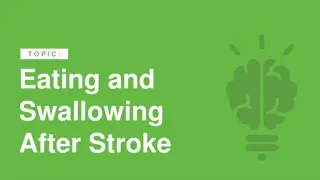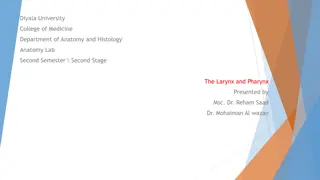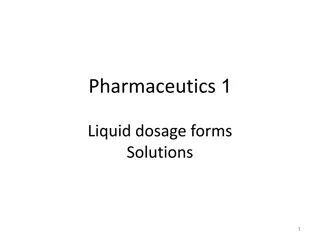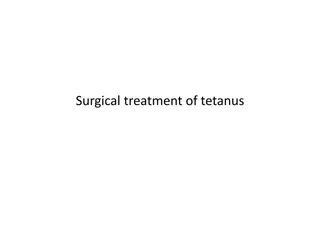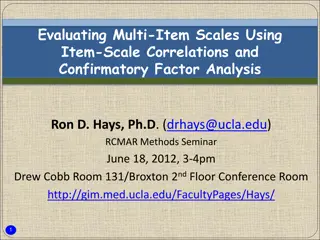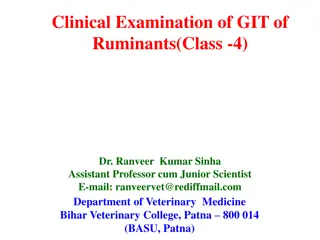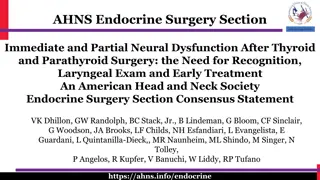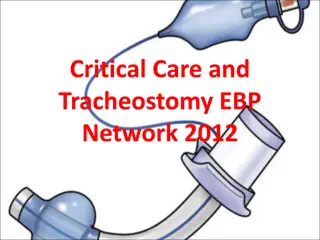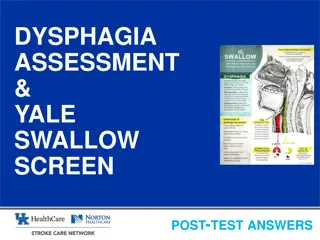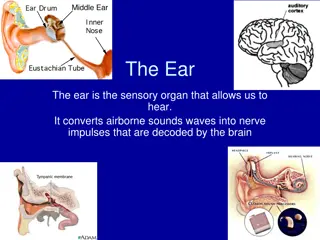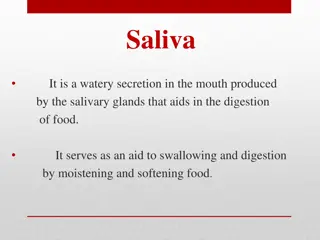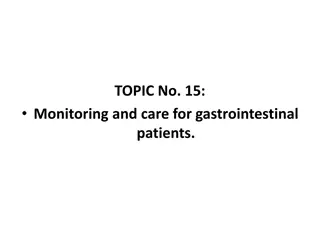Understanding Neurogenic Speech and Language Disorders in Adults
This chapter provides insight into language disorders in adults, including types of aphasia, causes such as toxins, traumatic brain injury, brain tumors, and strokes. It discusses cerebral hemorrhage, occlusive strokes, ischemic stroke, transient ischemic attacks, and cerebral thrombosis. The conten
1 views • 34 slides
Anatomy of the Larynx, Trachea, and Bronchi: Respiratory System Overview
The larynx, trachea, and bronchi are vital structures of the respiratory system with distinct functions and anatomy. The larynx houses vocal cords, aids in breathing, voice production, and swallowing. It is interconnected with major arteries, veins, and nerves in the neck. The trachea extends from t
12 views • 19 slides
Overview of Digestive System Physiology and Functions
The digestive system functions to break down food into absorbable forms through processes like ingestion, propulsion, digestion, absorption, and elimination. Specific organs and enzymes play key roles in these processes, ultimately providing nutrients for the synthesis of body constituents and energ
0 views • 13 slides
Understanding Thickened Liquids in Dysphagia Management
Thickened liquids are often recommended for residents with swallowing difficulties to prevent aspiration pneumonia. Recommendations are typically made by speech pathologists, with nursing sometimes adjusting based on availability of therapy. Aspiration pneumonia occurs when substances are inhaled in
2 views • 33 slides
Understanding the Physiology of the Sensory Organ - Tongue by B.K. Singh
Taste perception on the tongue is a vital sensory function involving sweet, sour, salty, and bitter sensations. The tongue, with its muscular movements and taste buds, plays a crucial role in mastication, swallowing, and food enjoyment. Different types of papillae on the tongue are responsible for t
4 views • 33 slides
Understanding Pharyngitis: Causes, Symptoms, and Management
Pharyngitis is an inflammation of the pharynx characterized by coughing, painful swallowing, and appetite changes. It can be caused by physical or infectious factors, leading to symptoms such as virtual obstruction, regurgitation, and drooling. Understanding the etiology and pathogenesis is crucial
1 views • 32 slides
Understanding Dosage Forms and Excipients in Medication Design
Dosage forms play a crucial role in the safe delivery and effectiveness of medications. They serve various purposes such as protecting drugs from environmental factors, controlling drug release, and providing different routes of administration. Excipients like flavors, colorants, and preservatives a
0 views • 27 slides
Understanding Orofacial Development and Functions in Dentistry
Explore the intricate orofacial structures, including dental arches, naso-maxillary complex, mandible, and muscles of expression, mastication, and deglutition. Learn about the various functions performed by the orofacial complex, such as mastication, deglutition, respiration, and speech. Dive into t
1 views • 23 slides
Understanding Gastric Motility and Secretion in the Stomach
The stomach plays a crucial role in food processing, acting as a reservoir, preparing chyme for digestion, and facilitating absorption. Divided anatomically and physiologically, it functions as a storage unit and mixing chamber for food. Key motor functions include storage, preparation for digestion
0 views • 49 slides
Understanding Documentation and Regulatory Standards in SLP Practice
Learn about regulatory standards for documenting speech-language pathology (SLP) services, including Medicare regulations and evidence-based practices. This course provides practical case studies for applying learned material, covering topics such as skilled care, complex documentation, and hands-on
0 views • 83 slides
Speech Therapy Guidelines and Medicare Regulations Overview
This content provides detailed information on writing person-centered functional goals in speech therapy, emphasizing SMART goals and best practices. It covers course descriptions, objectives, and Medicare regulations related to speech therapy services. The importance of reasonable and necessary evi
0 views • 90 slides
Speech-Language Pathologist's Role in TBI Assessment & Treatment
Speech-language pathologists play a crucial role in assessing and treating traumatic brain injuries (TBI) which affect millions annually, with significant impact on children. SLPs collaborate with medical specialists, provide screenings, comprehensive evaluations, treatment development, and advocacy
0 views • 44 slides
Understanding Dysphagia in the ICU: Assessment and Impact
Dysphagia, the difficulty in swallowing, is a common issue in the ICU, affecting a significant percentage of intubated patients. It increases mortality, risk of pneumonia, malnutrition, and prolongs hospital stays. Assessment methods like bedside evaluation and FEES are crucial in managing dysphagia
5 views • 8 slides
Understanding Achalasia: Therapeutic Approaches, Pathophysiology, and Clinical Manifestations
Achalasia is characterized by a failure of the lower esophageal sphincter to relax, leading to difficulty in swallowing and regurgitation. The exact cause is unknown, but autoimmune factors and chronic infections may play a role. Symptoms include dysphagia, chest pain, regurgitation, and weight loss
0 views • 59 slides
Understanding Gastrointestinal Motility: Key Concepts and Mechanisms
Gastrointestinal motility involves various processes like peristalsis, segmentation, basic electrical activity, and the migrating motor complex. Peristalsis is the reflex response to gut wall stretching, while segmentation helps mix intestinal contents and digestive juices. Basic Electrical Rhythm (
0 views • 19 slides
Understanding Section K: Swallowing and Nutritional Status Assessment
Section K assesses conditions impacting residents' nutrition and hydration. It covers swallowing disorders, weight changes, and nutritional approaches. Proper coding and care planning are essential for accurate assessment. The section includes evaluation of swallowing difficulties, weight measuremen
0 views • 26 slides
Understanding Capsules in Pharmacy: Types, Advantages, and Disadvantages
Capsules in pharmaceuticals are solid unit dosage forms encasing precise amounts of medicines in gelatin shells. They come as hard or soft gelatin capsules, offering benefits like easy swallowing, taste masking, rapid release of medication, and cost-effectiveness. However, capsules have limitations
0 views • 84 slides
Managing Eating and Swallowing Challenges After Stroke
Dysphagia, a common issue after a stroke, can lead to difficulty swallowing and may require texture modifications in food and fluids for safety. Up to 65% of stroke survivors may experience dysphagia, which can lead to complications like pneumonia. Proper oral care, mealtime positioning, and awarene
0 views • 9 slides
Comprehensive Overview of Head and Neck Cancer by Dr. Swati Lambor, ENT Consultant
Cancer of the head and neck region poses a significant threat, with various types of tumors affecting areas like the nasal cavity, paranasal sinuses, mouth, larynx, salivary glands, and thyroid. Dr. Swati Lambor, a skilled ENT consultant at Manipal Hospital in Goa, sheds light on the causes, progres
0 views • 72 slides
Anatomy of the Pharynx: Structure and Function
The pharynx is a musculomembranous tube that connects the nasal and oral cavities to the larynx and esophagus. It is divided into three parts: nasopharynx, oropharynx, and laryngopharynx, each with unique features and functions. Muscles like pharyngeal constrictors and palatopharyngeus play a crucia
0 views • 31 slides
Understanding Solutions in Pharmaceutics: Advantages, Disadvantages, and Classification
Solutions in pharmaceutics are liquid preparations containing chemical substances dissolved in a solvent. They can be formulated for different administration routes like oral, parenteral, and topical. While solutions offer benefits like easier swallowing and quicker effectiveness, they also have dra
0 views • 116 slides
Understanding Thickened Fluids in Aged Care Facilities
Exploring the adequacy of thickened fluids in residential aged care settings, a study examined staff perceptions, preparation factors, adherence to IDDSI standards, and issues related to dysphagia. Findings revealed barriers, enablers, and the importance of staff education and support in ensuring th
0 views • 7 slides
Understanding Tetanus: Causes, Symptoms, and Treatment
Tetanus, also known as lockjaw, is a bacterial infection characterized by muscle spasms that can lead to severe complications. It is caused by the bacterium Clostridium tetani, commonly found in soil, saliva, and manure. Symptoms include muscle spasms, lockjaw, and difficulty swallowing. Tetanus can
0 views • 10 slides
Development and Evaluation of PROMIS GI Distress Scale: Hypothesized Scales and Item Descriptions
This presentation discusses the development and evaluation of the PROMIS GI Distress Scale, consisting of 8 hypothesized scales (Gastroesophageal reflux, Disrupted swallowing, Diarrhea, Bowel incontinence/soilage, Nausea and vomiting, Constipation, Belly pain, Gas/bloat/flatulence) with a total of 1
0 views • 30 slides
Understanding Myasthenia Gravis: Symptoms, Causes, and Treatment
Myasthenia gravis is a condition characterized by muscle weakness and rapid fatigue due to communication issues between nerves and muscles. While there is no cure, treatment options are available to manage symptoms such as weakness, double vision, and difficulties with speech and swallowing. Factors
0 views • 21 slides
Clinical Examination of Gastrointestinal Tract in Ruminants - Summary and Observations
Detailed examination of the gastrointestinal tract (GIT) in ruminants is crucial for diagnosing various diseases. Dr. Ranveer Kumar Sinha, an Assistant Professor cum Junior Scientist at Bihar Veterinary College, provides insights into the clinical examination, anatomy, history, and observations rela
0 views • 29 slides
Understanding Vocal Fold Paralysis and Neural Dysfunction After Thyroid and Parathyroid Surgery
This consensus statement by the American Head and Neck Society Endocrine Surgery Section highlights the importance of recognizing immediate vocal fold paralysis (VFP) and partial neural dysfunction (PND) following thyroid and parathyroid surgery. The report emphasizes the need for early identificati
0 views • 17 slides
Understanding Dementia and Speech Therapy by Vincent Delgiudice
Dementia impacts speech, swallowing abilities, and quality of life. Vincent Delgiudice, a certified SLP, offers therapy to enhance memory, communication, and safe swallowing strategies. Dysphagia in dementia needs evaluation for proper treatment. Learn about types of dementia symptoms and different
0 views • 19 slides
Analysis of Character Development in "Swallowing Stones Journal
In "Swallowing Stones Journal," we explore the character development of Michael and Jenna through various chapters. Michael's transformation from a carefree individual to someone haunted by guilt is contrasted with Jenna's coping mechanisms and growth. The narrative delves into themes of responsibil
0 views • 13 slides
Evidence-Based Practice in Critical Care: Focus on FEES in Dysphagia Management
This presentation outlines the activities of the Critical Care and Tracheostomy EBP Network in 2012, including a review of the year, changes in leadership, and discussions on the use of Fiberoptic Endoscopic Evaluation of Swallowing (FEES) in critical care settings. Various research articles are dis
0 views • 16 slides
Anatomy and Physiology of the Throat: A Comprehensive Overview
The throat, comprising the mouth, pharynx, and associated structures, plays vital roles in digestion, communication, and breathing. Understanding the anatomy and physiology of the throat, from the oral cavity to the laryngopharynx, helps in comprehending functions like swallowing, sound production,
0 views • 15 slides
Understanding the Context of Matthew 23:16-24 and the Strain of Gnat and Swallow of Camel
In Matthew 23:16-24, Jesus rebukes the scribes and Pharisees for prioritizing trivial matters over justice, mercy, and faith. The metaphor of straining a gnat and swallowing a camel illustrates their hypocrisy and neglect of important matters. The passage emphasizes the importance of upholding signi
0 views • 10 slides
Speech Therapy for Adults - SpeakUp Centre
Speech therapy can be essential for adults facing a variety of medical conditions that impact communication. SpeakUp Centre is the top-notch care for adults facing speech and swallowing disorders.
4 views • 6 slides
Dysphagia Assessment & Yale Swallow Screen Post-Test Answers
Dysphagia assessment is crucial in identifying swallowing dysfunction. The post-test answers cover various aspects including definitions, statistics, patient management, and protocols like the Yale Swallow Screen. It emphasizes the importance of oral care, appropriate diet modifications, and when to
0 views • 12 slides
Understanding the Anatomy of the Ear
The ear is a complex sensory organ that enables us to hear by converting sound waves into nerve impulses processed by the brain. It consists of the outer, middle, and inner ear, each playing a crucial role in the hearing process. Changes in air pressure can affect the ear, causing discomfort that ca
0 views • 17 slides
Review of Dysphagia Care for Parkinson's Patients in Hospital
A review was conducted on the quality of dysphagia care provided to patients with Parkinson's disease aged over 16 years who were admitted to the hospital when acutely unwell. Key findings include the importance of documenting swallow status in referral letters, screening patients for swallowing dif
0 views • 24 slides
Understanding Saliva and Salivary Glands in Digestion Process
Saliva is a watery secretion produced by salivary glands in the mouth, aiding in food digestion, swallowing, and moistening food. Human salivary glands include parotid, submaxillary, and sublingual glands, each producing different types of secretions. The glands are made up of secretory acini and du
0 views • 29 slides
Essential Monitoring and Care for Gastrointestinal Patients
Learn about monitoring and caring for gastrointestinal patients, including identifying key symptoms like appetite changes, taste alterations, swallowing difficulties, gastric dyspepsia, and more. Discover how to provide proper nursing care, address acute abdominal pain and gastrointestinal bleeding,
0 views • 28 slides
